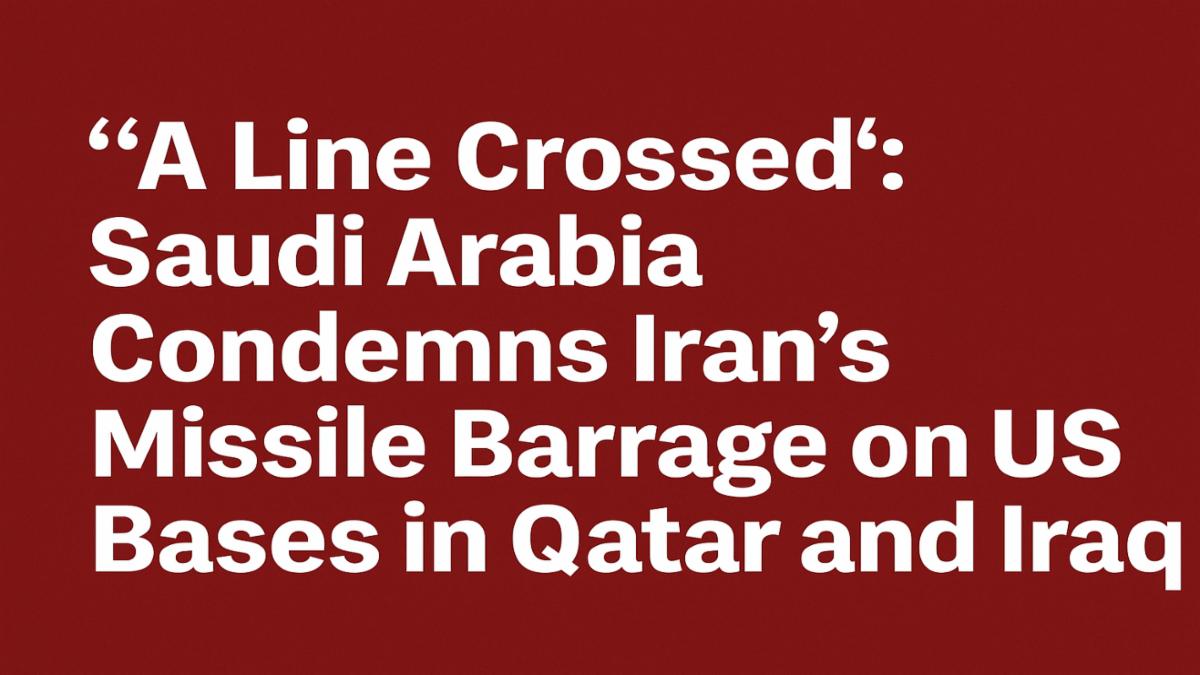Article Body
“A Line Crossed”: Saudi Arabia condemns Iran’s Missile Barrage on US Bases in Qatar and Iraq
By [Your Name] | Gulf Region Correspondent
In a jarring turn of events that rattled the fragile calm of the Gulf, Iran unleashed a coordinated missile barrage late Monday night targeting US military installations in Qatar and Iraq. As the reverberations of the strikes echoed through diplomatic circles, Saudi Arabia wasted no time in branding Tehran’s aggression as “unacceptable and unjustifiable,” voicing firm support for Qatar — a country with which it only recently repaired ties.
“We stand with Qatar in the face of this blatant violation,” read a statement from the Saudi foreign ministry, dripping with the gravity of a nation attempting to walk a tightrope between regional solidarity and geopolitical caution.
While no casualties were reported at the heavily fortified Al Udeid base in Qatar — the nerve center of US Central Command in the Middle East — the symbolism of the strike was unmistakable. Iran had just drawn a red line in the sand, and it did so with deadly precision.
Retaliation, or Escalation?
Iran dubbed the missile campaign Annunciation of Victory — a loaded title for a salvo of retribution following Sunday’s US airstrikes on three major Iranian nuclear facilities. According to Iranian state media, the number of missiles used was “equal in intensity and quantity” to the American attack.
“It wasn’t just a military response. It was a message,” said a Gulf-based analyst under condition of anonymity. “And that message was: ‘We can hit you where it hurts, even in your safest strongholds.’”
The strikes extended to Iraq’s Ain al-Assad air base, further fanning the flames. There, an Iraqi official, speaking off the record, confirmed the attack but withheld details — a silence that speaks volumes about the region’s unease.
Saudi’s Calculated Solidarity
What makes this situation more precarious is Saudi Arabia’s unambiguous backing of Qatar — a country it once embargoed for three years. The shift from estranged neighbors to regional allies seems now not just symbolic, but necessary.
“The Kingdom of Saudi Arabia condemns and denounces in the strongest terms the aggression launched by Iran against the sisterly State of Qatar,” the official statement declared. “This constitutes a flagrant violation of international law and the principles of good neighborliness.”
What’s more, the Kingdom went a step further, pledging “all its capabilities” in support of any protective measures Qatar may undertake. A powerful gesture, certainly — but whether it translates into direct involvement remains an open question.
Caught in the Crossfire
For Qatar, the timing couldn’t have been worse. With its skies already hosting the largest American military presence in the Middle East, the small but diplomatically agile nation now finds itself squarely in the crosshairs of a much larger conflict.
The Qatari government issued a rare rebuke of Tehran’s actions. While confirming no casualties, it made clear that it “reserves the right to respond,” language that hints at a more assertive stance than we’ve come to expect from Doha.
Online, the reactions were swift and emotional.
“I never thought I’d see Qatar dragged into this mess. We’re a peaceful nation, not a battlefield,” wrote one X (formerly Twitter) user under the handle @DohaWatcher.
“Iran just signed its own isolation note in the Gulf. That wasn’t strategy — that was stupidity,” posted another, @GulfEye2025.
No Easy Answers
Here’s the thing: while Saudi Arabia’s strong condemnation and Qatar’s measured outrage offer a united front, the underlying tensions remain volatile. Washington, predictably, confirmed the attack and vowed a response “at a time and manner of its choosing.”
That said, the risk of escalation looms large. With nuclear sites bombed and missile strikes flying, diplomacy may already be a step behind the battlefield.
As one former Gulf diplomat put it, “The chessboard is full. And someone just flipped it over.”

Comments